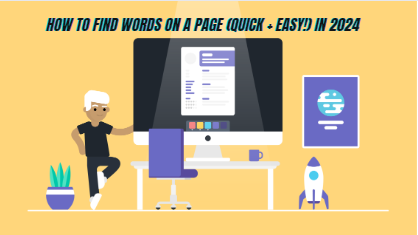Tired of wasting time scrolling through massive documents or websites looking for that one crucial bit of information? But here’s the good news: there’s a way out of this madness!
Today, we’re showing you how to find words on a page – it’s the key to becoming a productivity powerhouse. Whether you’re using a computer, phone, or tablet, you’ll be pinpointing the exact text you need in no time. Let’s dive in!
The Magic Shortcut: Ctrl + F (or Command + F)
Think of this as your secret weapon! On most computers (Windows or Mac), hitting “Ctrl + F” (or “Command + F” if you’re a Mac person) will bring up a little search bar. This is the key to instant results. Type in whatever word or phrase you’re hunting for, and boom, the page highlights every single match.
Phone and Tablet Superpowers
Don’t worry, I haven’t forgotten about your phone and tablet users. Most browsers and document apps have a “Find on Page” or similar option tucked away in their menus (usually under those three dots or lines you see in the corner). Tap that, type in your search terms, and enjoy the same highlighting magic as on a computer.
Search Engines for Specific Websites
If you need to find information on a large or complex website, sometimes the site’s built-in search tools aren’t the best. Here’s when you turn to the power of Google or Bing:
- Format: In the search bar, type site:websitename.com followed by the word or phrase you’re looking for. Example: site:wikipedia.org evolution
- This tells the search engine to only look within that specific website, making your results much more focused.
Specialized Keyword Tools
Mainly useful for website owners and marketers, these tools show how often specific keywords appear on a page and their overall placement. This helps with things like search engine optimization (SEO):
- AIContentfly: Provides comprehensive analysis and suggestions for improving content using different keywords.
- Ahrefs, SEMRush: Advanced SEO platforms that include keyword research and content analysis features.
Pro Tips for Word Search Ninjas
Ready to level up? Here are a few extra tips:
- Get Specific: The more specific your search terms, the faster you’ll find what you need.
- Match Case: Need to find an exact capitalization? Most search tools have a “Match Case” option.
- Whole Words Only: Avoid false matches by looking for “Whole Words” – handy if you have common words in your search.
Why Searching for Words Matters
It’s not just about laziness (though let’s be real, it helps!). Mastering word search saves you:
- Time: Find facts, figures, and quotes instantly. So if you want to find, for example, a word that rhymes with “ant” for your writing piece, having the ability to spot the word in 1-sec would save you tons of time!
- Frustration: Avoid endless scrolling and eye strain
- Focus: Stay on task and improve your workflow
You can also identify word frequencies on a page. It’s almost like having a word cloud displayed in front of you.
See? It’s a total game-changer.
So, the next time you’re stuck playing digital hide-and-seek with a webpage, remember your newfound search powers. I promise your eyes, sanity, and productivity levels will thank you!
